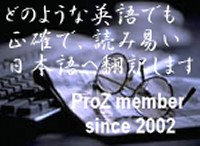How to translate formal documents like minutes of meetings or manuals from English to japanese. Thread poster: Ruchira Shukla
|
|---|
While translating formal documents in japanese from english should one end the sentence in aru form or imasu/ arimasu form.I have seen both endings and am really confused about which one to use while translating.
| | | | mora339
Local time: 09:43
Japanese to English
+ ...
| a little complicated | Jan 22, 2003 |
Hi. It\'s a bit complicated. Here\'s my thinking. If you\'re doing minutes of meetings I think you want to use ARU-style, exception is when you quote conversation that\'s when you want to use MASU-style. On the other hand when you\'re doing manuals it\'s more normal to use MASU-style. Sorry I\'m not smart enough to give you the logic but that\'s at least what I have been familar with in my whole life as a Japanese business person. See you.
| | | | ejprotran
Local time: 09:43
English to Japanese
| Imasu/arimasu | Jan 22, 2003 |
For a basic understanding, \"arimasu\" is used to express the existence of an inanimate object (e.g., book, stone, etc.), while \"imasu\" is used for animate entities (e.g., people, animals, etc.).
Here are the links that may be... See more For a basic understanding, \"arimasu\" is used to express the existence of an inanimate object (e.g., book, stone, etc.), while \"imasu\" is used for animate entities (e.g., people, animals, etc.).
Here are the links that may be of help to you:
http://japanese.about.com/bllesson28.htm
http://www.asahi-net.or.jp/~IF2N-SZK/j4.html ▲ Collapse
| | | | Ruchira Shukla
India
Local time: 06:13
English to Japanese
+ ...
TOPIC STARTER
Thank you .. that was informative. I will try to use this same format from now on.
Ruchira
Quote:
On 2003-01-22 14:31, mora339 wrote:
Hi. It\'s a bit complicated. Here\'s my thinking. If you\'re doing minutes of meetings I think you want to use ARU-style, exception is when you quote conversation that\'s when you want to use MASU-style. On the other hand when you\'re doing manuals it\'s more normal to use MASU-s
... See more Thank you .. that was informative. I will try to use this same format from now on.
Ruchira
Quote:
On 2003-01-22 14:31, mora339 wrote:
Hi. It\'s a bit complicated. Here\'s my thinking. If you\'re doing minutes of meetings I think you want to use ARU-style, exception is when you quote conversation that\'s when you want to use MASU-style. On the other hand when you\'re doing manuals it\'s more normal to use MASU-style. Sorry I\'m not smart enough to give you the logic but that\'s at least what I have been familar with in my whole life as a Japanese business person. See you.
▲ Collapse
| | | | To report site rules violations or get help, contact a site moderator: You can also contact site staff by submitting a support request » How to translate formal documents like minutes of meetings or manuals from English to japanese. | TM-Town | Manage your TMs and Terms ... and boost your translation business
Are you ready for something fresh in the industry? TM-Town is a unique new site for you -- the freelance translator -- to store, manage and share translation memories (TMs) and glossaries...and potentially meet new clients on the basis of your prior work.
More info » |
| | Protemos translation business management system | Create your account in minutes, and start working! 3-month trial for agencies, and free for freelancers!
The system lets you keep client/vendor database, with contacts and rates, manage projects and assign jobs to vendors, issue invoices, track payments, store and manage project files, generate business reports on turnover profit per client/manager etc.
More info » |
|
| | | | X Sign in to your ProZ.com account... | | | | | |




